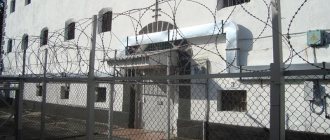The standard duration of quarantine in prison is 15 days. During this period, the presence of serious diseases among convicts is revealed and a decision is made on the possibility of treatment. All results of the medical examination are recorded in the prisoner’s personal card.
Not everyone knows what quarantine in prison is. If a decision has been made to isolate a citizen from society for a crime committed, he will have to go through a number of preparatory procedures. One of them is quarantine in prison. This stage of serving a sentence is considered by many to be decisive for faster adaptation to the harsh conditions of a correctional institution. In quarantine, medical specialists from various fields work who can identify the presence of diseases in prisoners and refer them for treatment.
Concept and purposes of quarantine
The concept of quarantine in a colony exists not only in the medical field, but also in the field of criminal procedural law. In this context, the term means that certain procedures are carried out on incoming prisoners, after which they are placed in a cell.
All actions taken are regulated and must comply with the established Internal Regulations, approved by Order of the Ministry of Justice No. 189. Clause 18 provides for the following actions with newly admitted convicts:
- Passing fingerprinting.
- Photography.
- Primary sanitary reception.
- Full inspection of existing personal belongings.
- Preparation of documents.
- Placement in special quarantine cells until a full medical examination is carried out.
For the first time for a medical examination, the prisoner ends up in a pre-trial detention center. Procedural measures include a full medical examination, during which prisoners are diagnosed with various diseases that can cause harm to other persons serving sentences in the colony. During the procedures, I determine and record the following in a prisoner:
- The presence of serious diseases: HIV, syphilis, various infections and other diseases.
- All the special features of the prisoner: tattoos, anomalies of physical development, scars.
- If an admitted convict has a plaster cast, prosthesis or bandages, they are removed and carefully examined.
Prison and life behind bars
Only when you enter the zone, you will find out what awaits you there - a baton or bread and salt. Everywhere is difficult at the beginning. Whether it's a new job or prison time.
The first day in a correctional colony is also troublesome... You go to the zone.
For several days you travel in a “” carriage, not being able to properly go to the toilet or sleep in a crowded, barred compartment.
You eat only dry rations consisting of bread, herring and sugar.
Things are no better when you arrive in the zone by car from the pre-trial detention center. In the pre-trial detention center they wake up at about five in the morning. They are lowered into a storage chamber, or “glass”. First the prison staff rush around, then the receiving convoy. It’s not normal to fold things. They don’t give you packed rations, explaining that you are no longer on allowance in the pre-trial detention center, and it’s not far to go.
You are also not yet registered in the zone.
So for a day or more they don’t feed at all.
Duration of quarantine
Immediately after entering the institution where the prisoner will serve his sentence, he is placed in a special department. The time spent in quarantine can reach 15 days. The same quarantine time in prison has been established for persons who have the status of “accused” and “convicted”. How long the quarantine in a zone lasts is regulated by the Penal Code, Article No. 79. But this rule is not mandatory.
If necessary, the period of quarantine may be extended. Such a decision may be made by the head of the correctional institution in exceptional cases. This right is given by paragraph No. 2 of the Internal Regulations of a correctional institution. An example of such a situation could be a suspicion of a serious illness in a convicted person, which requires more time to identify.
This is due to the fact that in some regions of the Russian Federation the number of HIV carriers is quite large. The medical staff of the correctional institution have to observe increased security measures and keep people in quarantine until the results of all tests are received.
nobleprisoner
My friend and I were in quarantine for three days.
As I said earlier, this is a cell where new arrivals to pre-trial detention center No. 1 are placed, and then distributed to permanent cells until the investigation into the prisoner’s case is completed and a sentence is passed. While we were in quarantine for all these three days, new prisoners were slowly brought into the cell, and they, just like us at the very beginning, stood for several seconds, not knowing what to do and where to go. In general, the situation in the cell was tolerable, except for that guy who looked like an underdeveloped and complete scumbag.
We recommend reading: How to name your women's clothing store
His very presence and activity strained many, especially newcomers.
But it seemed to me that the planers who were in the cell also did not feel particularly comfortable with him. Even when he was sleeping, and there were such moments, the prisoners tried not to wake him up again.
And when he went to bed, he even managed to hurt someone. Then someone will ask for a jacket
Medical procedures
Activities carried out with a prisoner in quarantine in prison are strictly regulated by two legislative acts:
- Code of Criminal Procedure.
- Local acts adopted within the correctional institution.
Persons admitted to the pre-trial detention center are examined by the doctor on duty. He asks questions about the person's general physical condition and health complaints. Next comes a set of medical procedures:
Have a question for a lawyer? Ask now, call and get a free consultation from leading lawyers in your city. We will answer your questions quickly and try to help with your specific case.
Telephone in Moscow and the Moscow region: +7
Phone in St. Petersburg and Leningrad region: +7
Free hotline throughout Russia: 8 (800) 301-39-20
- Blood pressure measurement.
- Donating blood for sugar levels.
- Laboratory testing of urine and feces.
- Weighing a prisoner.
- Measuring head circumference.
- Fluorography.
The received data must be entered into the prisoner’s personal card. The listed set of measures is mandatory for every prisoner.
If there are complaints about specific diseases, the patient is referred to a specialized doctor, who will determine the presence of the stated problem and the degree of its danger to the health of the person and others. If no serious problems are found, the convict is sent to a place of general detention. If there are bruises and abrasions on the prisoner’s body, internal organs will be checked for ruptures and bleeding.
All recorded information is entered into the patient’s card. A citizen suspected of committing a crime has the right to receive copies of the results of a medical examination, which are certified by the signature of medical personnel and the head of the guard. The lawyer can attach another copy of the medical certificate to the materials of the case under consideration.
If the convicted person believes that the medical examination performed did not comply with the established rules, he may request that a similar examination be carried out by other medical specialists. If the administration of the pre-trial detention center refuses such a request, it is necessary to file a complaint with the court or the prosecutor's office with a corresponding statement.
The administration of the correctional institution is interested in ensuring that prisoners are fully checked and that all deviations in health are recorded before serving their sentences in common cells. In the event of a sharp deterioration in the health or death of a prisoner who has undergone quarantine, a number of questions from regulatory authorities will arise to the management of the correctional institution.
Some convicts, knowing this, use various methods to make their health state recognized as worse than it actually is. Malingerers, therefore, want to receive certain relaxations while serving their sentence.
If serious diseases are detected (HIV, syphilis, tuberculosis), the patient is sent to a hospital located on the territory of the pre-trial detention center.
There is a certain nuance when conducting medical examinations. Internal regulations prohibit personal searches of convicts by persons of the opposite sex. According to paragraph 28, this rule does not apply to medical personnel.
One of the responsibilities of the management of the pre-trial detention center is the creation of conditions to support the health and protection of the lives of prisoners. The premises of the correctional institution must be maintained in cleanliness and sanitary standards. The pre-trial detention center offers additional paid medical services:
- Dental treatment and prosthetics.
- Manufacturing of glasses and shoes to order.
- Other services.
The established daily routine applies throughout the colony, including in quarantine.
- Daily formation and roll call.
- The lights in the cells are on 24 hours a day.
But there are some differences. For example, meals are taken not in common canteens, but in cells. The guards deliver food in special bowls and hand them over to the prisoners.
What happens during quarantine
Once it has been determined that this is a quarantine in the zone, it is necessary to find out what is happening within it. Legal regulation of this action is carried out:
- Criminal Procedural Code of the Russian Federation.
- Order of the Ministry of Justice regulating the procedure for holding citizens in custody.
- Internal local acts of a pre-trial detention center or correctional institution.
During quarantine, a set of procedures takes place, which begin with an examination by a doctor - paramedic. It identifies the primary complaints of the incoming person, measures blood pressure and blood sugar. Takes other tests (stool, urine, blood). After which a laboratory test is carried out.
In a situation where there are any assumptions about a citizen’s painful condition, he is sent for examination to a specialized specialist. He finds out whether there are reasons for concern. If there are none, then the citizen goes to general places of detention reserved for all other citizens there.
In a situation where a dangerous disease has been identified, there are several options for action. If we are talking about a temporary detention facility, then in such institutions, as a rule, there are no special places for sick people. Only in exceptional cases can they be sent for treatment to a hospital located at a pre-trial detention center.
In most cases, sick persons are kept together with everyone else. Therefore, in a pre-trial detention center there is always a huge risk of getting serious viral diseases. If a prisoner is diagnosed with any dangerous disease, then he can be sent for treatment to a hospital located at the pre-trial detention center
If we talk about direct places of deprivation of liberty, then in this situation everything is much better. If diseases are detected, the administration of the institution has the right to petition the court to change the place of serving imprisonment from a correctional institution to a medical correctional institution (medical correctional institution).
They provide comprehensive treatment for sick people. They are all distributed in departments specializing in a specific dangerous disease, which greatly reduces the risk of getting any disease there.
Of course, in reality, quarantine provides for slightly different conditions. Quarantine cells are often overcrowded and completely unsanitary; examinations by doctors are formal. Only airborne diseases are tested. Therefore, some prisoners are simply not treated by the colony's medical services.
How do they act during the quarantine process?
So, the definition of quarantine in places of detention was given above, and what exactly it includes will be described below.
Among the regulations that must be followed during quarantine are:
- Code of Criminal Procedure.
- Order of the Ministry of Justice, which regulates the presence of suspects and convicted persons in places of detention.
- Internal regulations adopted in places of deprivation of liberty, including pre-trial detention centers.
Quarantine includes a number of stages. The very first of them is an examination of the admitted person by a paramedic. It records the primary complaints of the person being examined, determines blood pressure and sugar levels. He also collects blood, urine and feces for laboratory testing.
If the paramedic notes certain signs that give reason to assume the presence of a painful condition, then he refers the prisoner admitted to him to the appropriate specialist.
This doctor determines whether there is any threat to health.
If, in the opinion of this specialist, there is no such threat, then the person admitted is sent to general places of detention, where the bulk of the prisoners of this institution are located.
If a disease that poses a danger has been diagnosed, then there are several possibilities.
If the described procedure took place in a pre-trial detention center, then in most cases the patient will still be sent to a place of general detention with healthy people.
The reason is that, in general, pre-trial detention centers do not have hospitals where such a contingent could be kept separately. It is worth noting that as a result, the risk of contracting any disease in a pre-trial detention center is very high.
At the same time, in institutions where sentences are executed against those already convicted, such a situation is much easier to avoid.
If, during the initial examination, it turns out that the admitted person is a carrier of a certain disease, then the management of this institution may send a petition to the court asking the court to establish a medical correctional institution (or LIU) as the place of serving his sentence.
There are a number of branches in this institution. They specialize in various disorders, and patients are referred to the department that treats their particular illness.
At the same time, in reality, quarantine often does not meet accepted requirements . The cells where inmates are placed can be overcrowded and conditions are often unsanitary.
For their part, specialists can examine those admitted in a superficial manner. At the same time, they strive to identify only those diseases that are transmitted by airborne droplets.
Possibility of visiting
The possibility of a meeting of relatives with a suspected person is regulated by Article 18 of the Federal Law “Confinement of Suspected Persons” No. 103, as well as the Code of Criminal Procedure, Article No. 395. The listed legislative acts provide for the possibility of meeting with a person in quarantine only with the permission of the investigator or judicial authority.
This type of permit is issued extremely rarely. Visits and meetings with convicted persons who are in quarantine by their lawyers are allowed. The defense attorney has the right to use photo and video equipment on the territory of the pre-trial detention center, but only in the absence of the convicted person. Quarantine in prison does not impose restrictions on visits to convicts for medical personnel and the administration of the correctional institution.
What is it, why are quarantine cameras needed?
Quarantine in this context is not a simple medical term, but a concept of a criminal procedural nature , which means performing a series of procedural actions with a newly arrived prisoner, after which he must be taken to the cell. These procedures are regulated by the Internal Regulations, in accordance with Order of the Ministry of Justice of the Russian Federation No. 189 of October 14, 2005.
In accordance with paragraph 18 of the Rules, accused and suspects, after undergoing fingerprinting and photography, initial sanitary processing, inspection of personal belongings and documentation, are placed in cells of the quarantine department for a full medical examination.
For the first time, medical workers examine a prisoner when he first appears in a pre-trial detention center in order to avoid accusations of negligence from the administration of the institution, but such an examination is rather superficial. Procedural actions mean a thorough medical examination , during which it is revealed that the accused has signs of diseases that can cause harm to other persons in custody.
Read more about how to behave for the first time in a pre-trial detention center here.
- Firstly, such serious illnesses as tuberculosis, HIV, contagious venereal (syphilis), parasitic and infectious diseases are identified.
- Secondly, all the specific signs of the prisoner are noted - tattoos, scars, birthmarks, physical abnormalities. The patches are removed, prostheses, plaster casts and other dressings are examined.
In fact, it's not just honey. testing, but also some kind of “acclimatization” and familiarization with rules and routines, including informal ones.
How many days does it last?
Convicts arriving at correctional institutions are placed in a quarantine department for up to 15 days.
This period is the same for both accused and convicted persons and is regulated by Article 79 of the Penal Code of the Russian Federation. But this period is general. Read more about how time in a pre-trial detention center is counted towards the total term of imprisonment here.
A little over two weeks is not always enough to detect a serious illness , so the period has the right to be extended. This is done with the written permission of the head of the correctional institution (in exceptional cases), in accordance with Chapter 2 of the Internal Regulations.
The length of time is influenced by many factors, including even geographical ones: for example, in Kaliningrad (and, of course, in pre-trial detention centers), the number of HIV-infected people is so large that medical staff have to be especially vigilant and keep prisoners in quarantine for as long as possible, until all test results are received .











